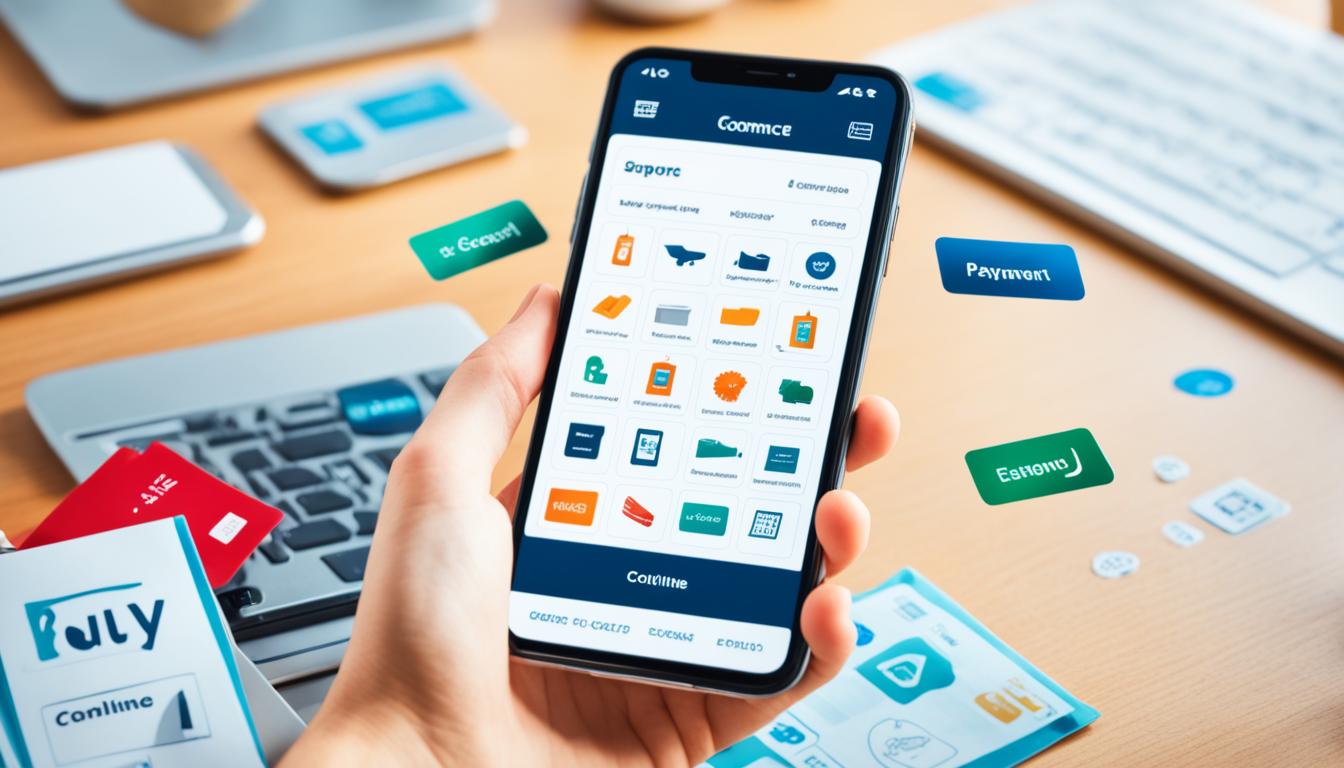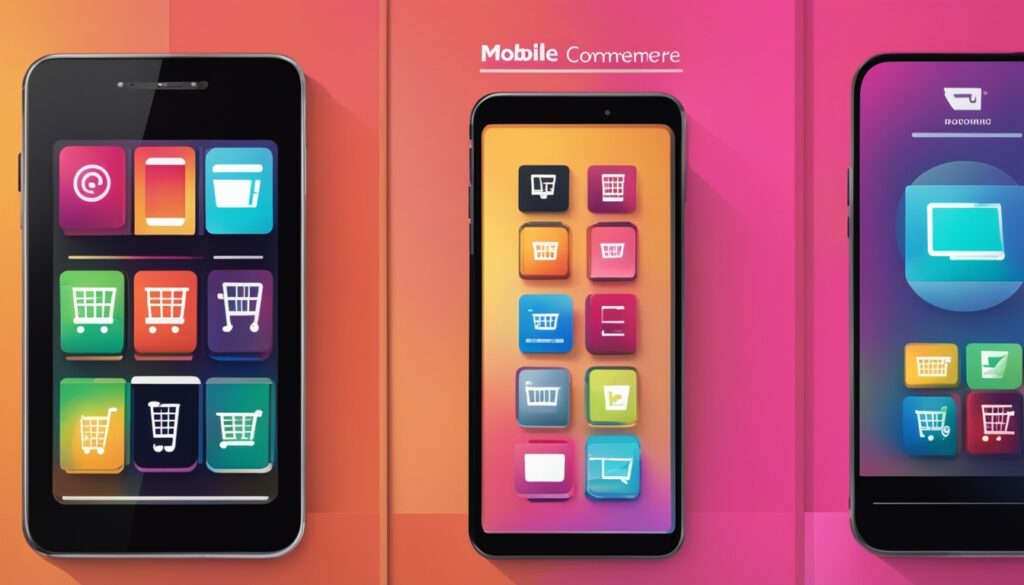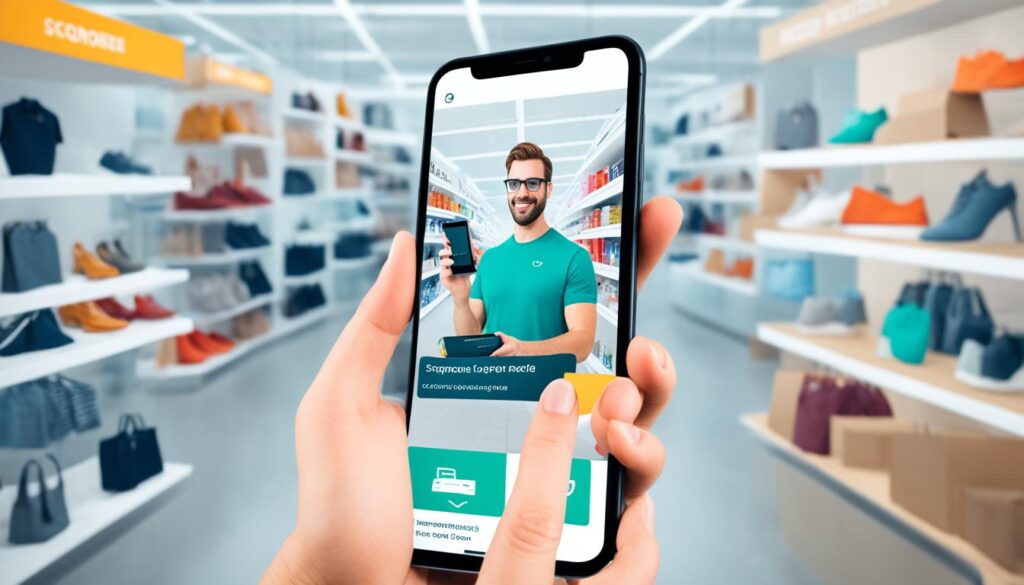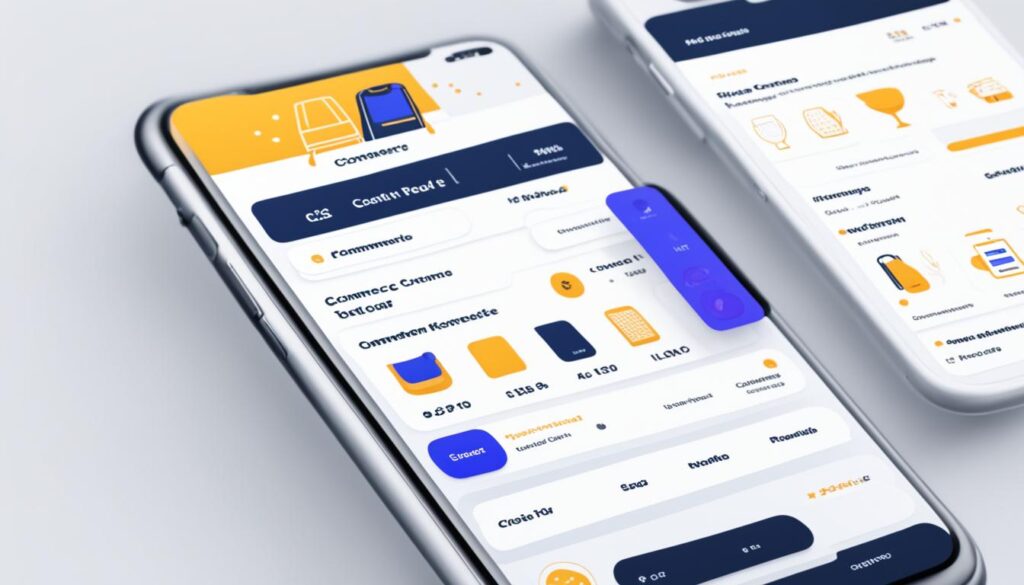The world of online shopping has changed a lot, thanks to mobile commerce (or m-commerce). Now, people use their phones and tablets more for buying things and making payments. This means businesses need to make their e-commerce apps better to keep customers interested and increase sales.
This article looks at the main in making e-commerce apps for mobile devices. It talks about how mobile shopping is getting bigger and how making apps more personal is key. It also covers new tech like augmented reality and artificial intelligence. Plus, it looks at how progressive web apps, social commerce, and keeping data safe and private are important for online shops.
Knowing these trends helps e-commerce businesses make better apps. This can lead to more user interaction and more sales in a world where mobile is everything.
Table of Contents
Key Takeaways
- The rise of mobile commerce and the growing importance of e-commerce mobile apps
- The integration of personalized user experiences and cutting-edge technologies like augmented reality and AI
- The impact of progressive web apps, social commerce, and evolving security and privacy considerations
- Strategies for e-commerce businesses to enhance their mobile app offerings and drive sales
- The importance of understanding key trends in the e-commerce mobile app development landscape
The Rise of Mobile Commerce
The growth of mobile commerce, or m-commerce has changed how we shop and interact with online stores. This change comes from more people using smartphones and new ways of shopping.
Smartphone Adoption and Mobile Shopping Behavior
Smartphones have changed how we shop. Now, many people use their phones to look up products, compare prices, and buy things. Reports show that mobile shopping now makes up a big part of all online sales. Mobile devices drive over 70% of online traffic and are making more sales.
Benefits of Mobile Apps for E-commerce Businesses
E-commerce companies are now focusing on mobile apps to keep up with mobile commerce. These apps help keep customers interested, build loyalty, and increase sales. They offer a smooth shopping experience with features like push notifications and easy checkout.
“The future of e-commerce is undoubtedly mobile. Businesses that can effectively leverage the power of mobile commerce will have a significant competitive advantage in the years to come.”
As more people shop on their phones, mobile commerce offers big chances for online stores to connect with customers and grow their business.
Personalized User Experience
In today’s e-commerce world, making apps more personal is key. Companies use data to make their apps fit what each customer likes and does. This makes customers happier, more loyal, and more likely to buy more.
Personalization makes e-commerce apps more engaging and effective. By knowing what each customer wants, companies can offer a shopping experience that speaks to them. This makes customers feel closer to the brand and builds trust.
| Key Benefits of Personalized User Experience | Percentage of Customers |
|---|---|
| Increased customer satisfaction | 86% |
| Higher customer loyalty and retention | 79% |
| Improved conversion rates and sales | 75% |
At the heart of personalized user experience in e-commerce apps is using customer data. By looking at what customers browse, buy, and do, companies can offer personalized product tips, content, and deals. This makes shopping more relevant to each customer.
“Personalization is not just a nice-to-have, but a must-have in today’s competitive e-commerce landscape. Businesses that fail to deliver a personalized customer experience risk losing their customers to more innovative and customer-centric competitors.”
Using e-commerce personalization helps companies connect better with their customers. It leads to more engagement and can increase sales.
Augmented Reality and Virtual Try-On
In the fast-changing world of online shopping, augmented reality (AR) and virtual try-on are changing how we shop. These new tools let customers try on or explore products without leaving their homes. This makes shopping more fun and helps people make better choices.
Enhancing Product Visualization
AR lets customers put digital products right in their own space. This means they can see how something looks and fits before buying it. It makes shopping feel more real and helps customers understand products better.
Use Cases and Benefits
- Improved customer engagement: AR and virtual try-on features keep users interested, making them spend more time in the app and explore more products.
- Reduced return rates: Customers can see how products fit and look before buying, so they’re less likely to return them.
- Increased sales: Better product visualization and personalized try-ons make customers more confident in their choices, leading to more sales.
The use of augmented reality and virtual try-on in mobile apps is key for brands wanting to offer a unique and personal shopping experience.
| Feature | Benefit |
|---|---|
| Augmented Reality | Enables customers to visualize products in their own environment, improving product understanding and purchase confidence. |
| Virtual Try-On | Allows customers to virtually try on products, reducing the likelihood of returns and enhancing the overall shopping experience. |
Artificial Intelligence and Machine Learning
In the fast-paced e-commerce world, AI and ML are changing how mobile apps work. These technologies help e-commerce businesses give shoppers a better and smoother shopping experience.
Personalized Recommendations
AI and ML let e-commerce apps understand what users like and suggest products they might want. This makes shopping more fun and helps businesses sell more. Smart algorithms look for patterns to make smart suggestions, helping shoppers find things they’ll love.
Chatbots and Virtual Assistants
Chatbots and virtual assistants powered by AI and ML are changing how we get help in e-commerce apps. They can answer many questions, from product details to order updates, quickly and personally. This makes shopping easier, cuts down on wait times, and lets customer service teams focus on harder issues.
Using AI and ML, e-commerce companies can make their mobile apps better, more efficient, and more fun. This leads to happier customers and more sales. These new technologies are shaping the future of mobile shopping, offering new chances for businesses to succeed online.
Mobile Payment Integration
In today’s fast-changing e-commerce world, making mobile payment integration key is vital. By adding mobile payment options like digital wallets and contactless payments, online stores can make checking out easy for customers.
This easy checkout process cuts down on lost sales and increases customer happiness. As shoppers want a smooth checkout, adding mobile payments is now a must for online stores to compete.
Enhancing the Checkout Experience
By offering various mobile payment choices, online stores can give customers what they want: ease and flexibility. This means adding popular digital wallets like Apple Pay, Google Pay, and Samsung Pay, and also contactless payments for a smooth checkout.
- Reduce abandoned carts by making payments easier
- Boost sales with a hassle-free checkout
- Make customers happier and more loyal with easy payments
As mobile payments become more popular, online stores that focus on mobile payment integration will be ready for their customers’ needs. They’ll also stay ahead of the competition.
“Seamless mobile payment integration is no longer a luxury, but a necessity for e-commerce businesses looking to stay relevant and competitive in the market.”
Progressive Web Apps (PWAs)
In the fast-changing world of online shopping, progressive web apps (PWAs) are changing the game. They mix the web’s wide reach with the feel of native apps. This mix is set to change online shopping, making it smoother across many devices and internet speeds.
Bridging the Gap Between Web and Native Apps
PWAs connect traditional web pages with native apps. They use modern web tech to give you app features like working offline, sending notifications, and quick loading. You don’t need to download or update anything, making e-commerce PWAs easy to use and always up-to-date.
Benefits of PWAs for E-commerce
Using PWAs in online shopping brings big wins for both businesses and shoppers:
- Improved User Experience: PWAs give you a smooth, app-like experience on mobile, making shopping more fun and engaging.
- Increased Accessibility: Mobile web apps and e-commerce PWAs reach more people, even those who can’t download apps due to storage or internet issues.
- Better Performance: PWAs load fast, even on slow connections, making shopping smooth and quick.
- Cross-platform Compatibility: PWAs work well on all devices and systems, so you don’t need different apps for each one.
- Cost-effective Development: Making PWAs is cheaper than creating apps for each platform, helping online stores save money.
The growth of progressive web apps (PWAs) is a big chance for businesses. It lets them offer great user experiences, keep customers coming back, and grow in the mobile-first world.
Social Commerce Integration
The rise of social commerce has changed how we shop online, mixing social media with shopping. Now, e-commerce businesses see the value in e-commerce social integration to boost sales and loyalty. They use social media’s huge audience and fun nature to offer a smooth social media shopping experience that meets what customers like.
One big plus of social commerce is making in-app purchases right on social media. This cuts down on steps for customers, making them more likely to buy. Plus, sharing purchases and discoveries with friends helps spread the word about the brand.
Adding things like user stories and working with social media stars makes social commerce even better. It helps e-commerce brands gain trust and connect with customers and leaders in their field. This makes shopping more fun and real.
“Social commerce is the future of e-commerce, seamlessly blending the power of social media with the convenience of online shopping.”
By using e-commerce social integration, e-commerce businesses can tap into social networks’ big potential. This helps them increase sales, loyalty, and give customers a more personal and fun shopping experience.
Top Trends in E-commerce Mobile App Development
The world of e-commerce is always changing, making mobile apps key for businesses to keep up. There are big trends shaping the future of e-commerce mobile apps. These trends offer new ways to make shopping better and keep customers coming back.
One big trend is making shopping more personal. Companies use artificial intelligence (AI) and machine learning (ML) to give users product tips and make shopping smooth. This makes customers happier and helps businesses grow.
Another trend is using augmented reality (AR) and virtual try-on features. These let customers see products in their own space or try them on virtually. This makes buying decisions easier and cuts down on returns.
| Trend | Benefits |
|---|---|
| Personalized User Experience | Increased customer satisfaction, sales, and loyalty |
| Augmented Reality and Virtual Try-On | Improved product visualization, reduced returns |
| Seamless Mobile Payments | Frictionless checkout, increased conversions |
| Social Commerce Integration | Expanded customer reach, enhanced social engagement |
Seamless mobile payments and social commerce are also key for e-commerce apps. They make checking out easy and use social media to reach more customers. This helps businesses grow and give great experiences to shoppers.
As e-commerce apps keep changing, knowing about these e-commerce mobile app development trends and emerging e-commerce mobile app features is vital. It helps businesses stay ahead and give their customers the best shopping experience.
Mobile App Security and Privacy
The e-commerce world is growing fast, making mobile app security and data privacy key. It’s vital to keep customer info safe and build trust in mobile apps. This is a top priority for companies.
Importance of Secure Transactions
In today’s digital world, secure transactions are crucial for trust in e-commerce. Customers want their info kept safe from hackers. To do this, using strong encryption, tokenization, and more than one way to prove who you are is a must. This keeps mobile app security strong.
Data Privacy and Compliance
E-commerce data privacy is also vital. Companies must follow rules like the GDPR and CCPA. These rules help protect how customer data is used. Not following these rules can lead to big problems, like legal issues and losing customer trust.
| Key Considerations for Mobile App Security and Privacy | Best Practices |
|---|---|
| Encryption protocols | Use top encryption methods to keep data safe while it’s moving and when it’s stored |
| Secure transactions | Use tokenization and more than one way to prove who you are to keep financial info safe |
| Data privacy and compliance | Follow GDPR, CCPA, and other data protection laws |
| Vulnerability assessments | Do security checks often and fix any weak spots found |
| Mobile app security monitoring | Watch for threats in real-time and have plans to deal with them quickly |
Putting mobile app security and e-commerce data privacy first helps businesses gain trust. It also makes their brand stronger and keeps them ahead in the fast-changing e-commerce world.
Internet of Things (IoT) Integration
The use of IoT technology is changing the way e-commerce works. It gives businesses new ways to make shopping better and run smoother. With connected devices and smart home tech, e-commerce can offer a more personal and easy shopping experience.
IoT integration in e-commerce helps track and manage products and logistics better. Connected sensors keep an eye on stock levels, guess demand, and refill automatically. This cuts down on waste and makes the supply chain more efficient. IoT devices also give real-time info on how products are doing. This helps e-commerce companies make better choices and improve their products.
Smart home tech is another big win for e-commerce IoT. It connects with devices at home to give customers better product tips, easier ordering, and a better shopping experience. Picture a fridge that knows when you need more of something and orders it for you through your favorite app.
| Key IoT Use Cases in E-commerce | Benefits |
|---|---|
| Logistics Management | Improved inventory tracking, automated replenishment, and enhanced supply chain efficiency |
| Customer Experience Enhancement | Personalized product recommendations, simplified ordering, and seamless integration with smart home devices |
| Performance Analytics | Real-time data on product performance, enabling data-driven decision making and continuous improvement |
As connected devices and smart home tech get better, e-commerce has more chances to use IoT integration. By using this tech, e-commerce companies can lead in innovation. They can give their customers a shopping experience like no other.
“The integration of IoT technology is transforming the e-commerce landscape, enabling businesses to streamline operations, enhance customer experiences, and unlock new revenue streams.”
Subscription and Recurring Revenue Models
In the world of e-commerce mobile apps, subscription and recurring revenue models are becoming key. These models bring big benefits to both businesses and customers. They change how people interact and buy things.
Benefits and Use Cases
Subscription models and recurring revenue give e-commerce a big edge. They help build strong, lasting ties with customers. This leads to loyalty and steady money coming in. Plus, offering special bundles can make customers happier and more valuable over time.
A great example of an e-commerce subscription is monthly boxes of products picked just for you. It brings in steady money and helps businesses learn what customers like. This way, they can make their products even better.
| Benefit | Description |
|---|---|
| Improved Customer Retention | Subscription-based models make customers stick around more, cutting down on losing them. People want to keep their subscriptions going. |
| Predictable Revenue Streams | With recurring revenue, e-commerce gets a steady, reliable income. This makes planning money easier and more accurate. |
| Personalized Offerings | Subscriptions let businesses offer products or services just for you. This makes customers happier and more engaged. |
By using subscription models and recurring revenue, e-commerce can earn more money, build better relationships with customers, and succeed in the fast-changing mobile app world.
Mobile Loyalty and Rewards Programs
In today’s fast-changing online shopping world, mobile loyalty and rewards programs are key for keeping customers coming back. They offer special perks and benefits that make customers feel valued. This helps businesses build a loyal customer base, increase repeat sales, and grow sustainably.
Enhancing Customer Retention
Mobile loyalty programs let businesses connect with customers in a unique way. They reward customers for their actions and purchases. This makes a brand stand out and feel exclusive, leading to more loyal customers and higher lifetime value.
- Personalized rewards and offers based on customer behavior and preferences
- Exclusive access to sales, promotions, and product launches
- Seamless integration with mobile apps for a convenient customer experience
- Gamification elements to encourage active participation and engagement
These programs also give businesses valuable insights into what customers like and buy. This info helps improve marketing, products, and customer experiences. It’s a win-win for both the business and the customer.
| Benefits of Mobile Loyalty Programs | Examples |
|---|---|
| Increased customer retention | Amazon Prime, Sephora Beauty Insider |
| Higher customer lifetime value | Starbucks Rewards, Ulta Ultamate Rewards |
| Valuable customer data and insights | Target Circle, CVS ExtraCare Rewards |
By using mobile loyalty and rewards, e-commerce businesses build strong relationships with customers. This creates a sense of belonging and helps with long-term growth. As online shopping changes, these programs will become even more important for keeping customers and building loyalty.
Analytics and Performance Monitoring
In today’s fast-paced e-commerce world, having a strong mobile app is key for businesses to lead. At the core of this success are e-commerce analytics and mobile app performance monitoring. These tools help e-commerce companies make smart choices, improve their apps, and keep customers happy.
Good analytics help e-commerce companies understand how people use their apps, what they buy, and how they interact with the app. By looking at this data, they can make sure their apps stay useful and effective. Data-driven decision making is key, letting them tweak their strategies to better serve customers.
Analytics give a full picture of how the mobile app is doing. They track user actions, sales, and how often people come back. This info helps businesses spot issues, improve the app, and make more money.
Using mobile app performance monitoring helps e-commerce companies stay quick to change. They can see how stable the app is, how often it crashes, and how engaged users are. This info helps them make smart choices to keep their app leading the pack.
“In today’s competitive e-commerce landscape, mobile app analytics and performance monitoring are the keys to unlocking sustainable growth and customer loyalty.”
The role of e-commerce analytics and mobile app performance monitoring is vital as e-commerce grows. By using data, e-commerce companies can make their apps better, keep customers coming back, and stay ahead in the mobile market.
Conclusion
The world of e-commerce mobile apps is always changing. New trends are making their mark, from mobile shopping to making apps more personal. These changes focus on using the latest tech and keeping data safe and private.
By following the main e-commerce mobile app trends, like augmented reality and mobile payments, businesses can grow and succeed. As we look to the future, it’s key for companies to keep up with new changes. This will help them stay ahead in the mobile-first world.
The e-commerce mobile app world is set to get even better, changing how we shop online. By using mobile tech to their advantage, businesses can make shopping better for customers. This leads to better experiences, smoother operations, and more ways to make money.













